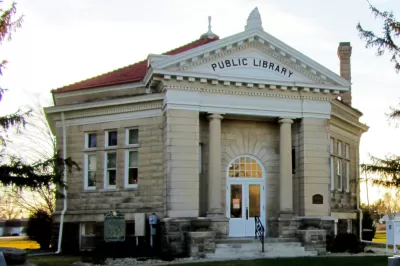Richard Florida talks with sociologist Eric Klinenberg about his new book and the places and organizations that help hold society together.

In Palaces for the People, Eric Klinenberg explores the idea of “social infrastructure,” the physical sites, institutions, and groups that are essential in developing a cohesive social fabric. In a conversation with Richard Florida, he describes social infrastructure’s importance and what happens when it frays:
When social infrastructure is robust, it fosters all kinds of social interactions, helps build relationships, and turns community from a vague, fuzzy concept into a lived experience. When social infrastructure is degraded and neglected, it makes it far more likely that we will grow isolated and be left to fend for ourselves.
Klinenberg says social infrastructure is as important to a well-functioning society as other types of infrastructure – water, energy, transportation – and it is made up of a range of private and public places. Childcare facilities, athletic fields, and schools all foster social interaction. The public library is an especially significant part of social infrastructure, says Klinenberg:
It provides a variety of services and public benefits for people of all ages and stations, regardless of social class, regardless of race or ethnicity, regardless of citizenship status. They’re amazing institutions that would be kind of inconceivable if we didn’t already have them. It’s hard to imagine this notion that every citizen has a right to their cultural heritage and to access a free place where they can better themselves outside of the market coming from a moment like this.
Klinenberg believes that social infrastructure, while not a panacea for society’s problems, does provide a sense of shared experience that is integral to repairing our divided society. In addition, he thinks that the strengthening of social infrastructure happens not at the highest levels of society but rather through public engagement in grassroots efforts.
FULL STORY: How ‘Social Infrastructure’ Can Knit America Together

Planetizen Federal Action Tracker
A weekly monitor of how Trump’s orders and actions are impacting planners and planning in America.

San Francisco's School District Spent $105M To Build Affordable Housing for Teachers — And That's Just the Beginning
SFUSD joins a growing list of school districts using their land holdings to address housing affordability challenges faced by their own employees.

The Tiny, Adorable $7,000 Car Turning Japan Onto EVs
The single seat Mibot charges from a regular plug as quickly as an iPad, and is about half the price of an average EV.

As Trump Phases Out FEMA, Is It Time to Flee the Floodplains?
With less federal funding available for disaster relief efforts, the need to relocate at-risk communities is more urgent than ever.

With Protected Lanes, 460% More People Commute by Bike
For those needing more ammo, more data proving what we already knew is here.

In More Metros Than You’d Think, Suburbs are Now More Expensive Than the City
If you're moving to the burbs to save on square footage, data shows you should think again.
Urban Design for Planners 1: Software Tools
This six-course series explores essential urban design concepts using open source software and equips planners with the tools they need to participate fully in the urban design process.
Planning for Universal Design
Learn the tools for implementing Universal Design in planning regulations.
Smith Gee Studio
City of Charlotte
City of Camden Redevelopment Agency
City of Astoria
Transportation Research & Education Center (TREC) at Portland State University
US High Speed Rail Association
City of Camden Redevelopment Agency
Municipality of Princeton (NJ)



























